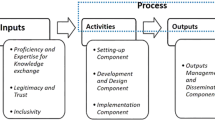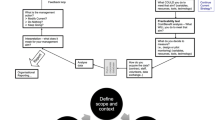Abstract
Resource management issues continually change over time in response to coevolving social, economic, and ecological systems. Under these conditions adaptive management, or “learning by doing,” offers an opportunity for more proactive and collaborative approaches to resolving environmental problems. In turn, this will require the implementation of learning-based extension approaches alongside more traditional linear technology transfer approaches within the area of environmental extension. In this paper the Integrated Systems for Knowledge Management (ISKM) approach is presented to illustrate how such learning-based approaches can be used to help communities develop, apply, and refine technical information within a larger context of shared understanding. To outline how this works in practice, we use a case study involving pest management. Particular attention is paid to the issues that emerge as a result of multiple stakeholder involvement within environmental problem situations. Finally, the potential role of the Internet in supporting and disseminating the experience gained through ongoing adaptive management processes is examined.
Similar content being viewed by others
Author information
Authors and Affiliations
Rights and permissions
About this article
Cite this article
Allen, W., Bosch, O., Kilvington, M. et al. Benefits of Collaborative Learning for Environmental Management: Applying the Integrated Systems for Knowledge Management Approach to Support Animal Pest Control. Environmental Management 27, 215–223 (2001). https://doi.org/10.1007/s002670010144
Issue Date:
DOI: https://doi.org/10.1007/s002670010144




